by Mark Smiley | Oct 22, 2021 | Uncategorized
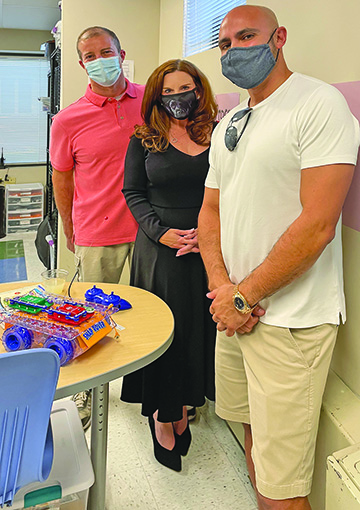
Left to right: Denver Academy parents and supporters Michael and Elizabeth King and Campos EPC SmartLab donor Marco Campos at the Grand Opening.
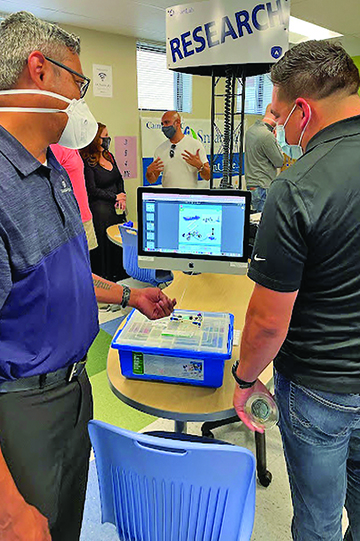
Campos EPC Representatives check out student projects at the DA Middle School Campos EPC SmartLab Grand Opening.
Denver Academy (DA), an independent school serving diverse learners in grades 1-12, recently celebrated the grand opening of the second SmartLab (Science, Math, Art, Robotics, and Technology) at the school provided through a donation from the Campos EPC Foundation.
The DA Middle School Campos EPC SmartLab was completed in the fall of 2020 and serves students in grades 7-8. It utilizes learning materials and a curriculum developed by Creative Learning Systems (CLS) that includes hands-on exploration of mechanics and structures, computer graphics, photo editing, 3D modeling, sound engineering, scientific data and analysis, digital communications, alternative and renewable energy, robotics and control technology, circuitry, film creation and editing, and software engineering.
While the lab opened for DA Middle School students a year ago, the official grand opening of the space was postponed due to the COVID-19 pandemic and took place on Sept. 9, 2021. Representatives from Campos EPC were in attendance, including Founder and Managing Principal of Campos EPC Marco Campos. Attendees were able to view and test some of the projects students have been working on in the lab.
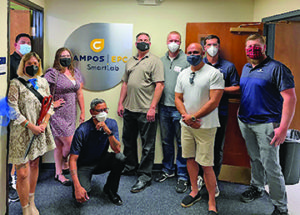
Campos EPC Representatives attend the Grand Opening of DA’s Middle School Campos EPC SmartLab on Sept. 9, 2021.
Denver Academy Head of School Mark Twarogowski attended and spoke about the importance of the Campos EPC SmartLab for the school’s students.
“We are so grateful to Campos EPC for their continued generous support, providing more than $300,000 for our two Denver Academy Campos EPC SmartLabs,” said Mark Twarogowski. “Together, in partnership with Creative Learning Systems, the labs provide the opportunity to immerse our younger students into the world of scientific exploration and discovery in a whole new way.”
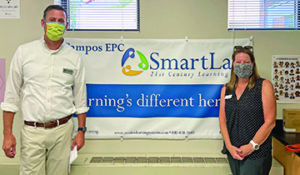
Denver Academy Head of School Mark Twarogowski, left, and Creative Learning Systems Regional Sales Manager Jeanne Timmons, at Grand Opening of Denver Academy’s Middle School Campos EPC SmartLab on September 9, 2021.
With the support of Campos EPC Foundation, the first SmartLab at Denver Academy opened in the Elementary/6th Grade Building for students in grades 1-6 in 2019. The school’s youngest students continue to benefit from instruction in the lab through which they’ve learned computer coding, problem-solving, and project management.
Based on the lab’s success, Denver Academy and Campos EPC again partnered with Creative Learning Systems to bring an additional lab to the DA Middle School.
“To be able to continue our partnership with Denver Academy to provide a SmartLab for middle schoolers is so exciting! I can’t wait to see what these bright minds continue to discover,” said Marco Campos, the founder and managing principal of Campos EPC. “Campos EPC is about more than just energy infrastructure; we want to build a better future for our communities and our kids.”
“With STEM occupations growing twice as fast as all others in the US[i], it’s critical that educators provide learners with hands-on, student-led, project-based learning opportunities,” said Creative Learning Systems CEO Ashley Mathis. “For 50 years, Denver Academy has had an exemplary record of providing students with a holistic academic experience. Creative Learning Systems is excited to support its mission of transforming lives and empowering young people by providing customized learning spaces that facilitate experiential, personalized, and collaborative experiences.”
by Mark Smiley | Oct 22, 2021 | Uncategorized

Volunteer Hours: During the month of July, in advance of Colorado Day, Alpine Bank’s nearly 800 employees engaged in 1,050 volunteer hours. Alpine Bank’s corporate, compensated volunteer program supports 19,200+ hours of community volunteer time each year. Employees can take 24 hours of annual paid volunteer time to help with causes that are as different as each individual, within a program that has grown organically.
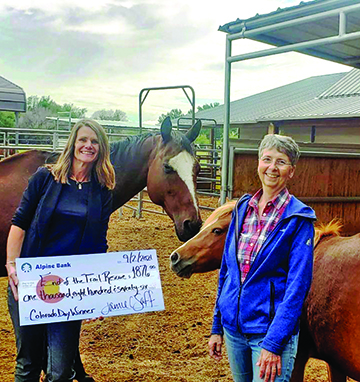
Recipient: End of the Trail Rescue is an Olathe nonprofit offering abused and neglected horses a second chance to be cared for, nurtured, and valued. The JP Pritchard Foundation of Durango helps young people in need, with an emphasis on vocational training, counseling, medical services, rehabilitation, and education. The Snowmass Chapel is a dynamic community of faith, serving residents and visitors to Snowmass.
 Like the Colorado River, Alpine Bank was born and raised in Colorado. Colorado Day, the state’s anniversary of joining the union in 1876, is now officially recognized annually, on August 1. To celebrate in 2021, Alpine Bank leadership created a celebratory sweepstakes to reward volunteerism and the vital work of community nonprofits in the state. Participants were asked to nominate their favorite nonprofit on the Alpine Bank Facebook page, making it eligible to win a grant of $1,876. In addition, the bank promoted volunteerism both internally with its employees, and externally with its customers.
Like the Colorado River, Alpine Bank was born and raised in Colorado. Colorado Day, the state’s anniversary of joining the union in 1876, is now officially recognized annually, on August 1. To celebrate in 2021, Alpine Bank leadership created a celebratory sweepstakes to reward volunteerism and the vital work of community nonprofits in the state. Participants were asked to nominate their favorite nonprofit on the Alpine Bank Facebook page, making it eligible to win a grant of $1,876. In addition, the bank promoted volunteerism both internally with its employees, and externally with its customers.
From nearly 900 nominees, three community nonprofits were selected by random drawing and each was awarded $1,876. They include the End of the Trail Rescue, the JP Pritchard Foundation, and the Snowmass Chapel.
“Supporting our community is foundational to Alpine Bank’s mission,” says Glen Jammaron, president of Alpine Bank. “Our enthusiasm for supporting the causes, charities, and organizations in Colorado is clearly matched by our customers, who engaged in this first-time sweepstakes with so many nominations of nonprofits they’re passionate about.”
The nearly 800 employees of Alpine Bank engaged in a total of 1,050 volunteer hours in August. The bank supports more than 19,000 hours of community hours a year by enabling employees to take up to 24 hours of paid time to volunteer for the groups and causes they support.
An employee-owned organization with $5.6 billion in assets headquartered in Glenwood Springs, Alpine Bank operates locations across Colorado and serves a total of more than 160,000 customers. For more information, visit www.alpinebank.com.

by Regan Bervar | Oct 22, 2021 | Editorials
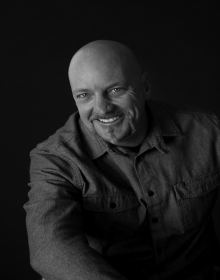 by Luke Schmaltz
by Luke Schmaltz

Seven Officers who hold this badge may soon be left empty handed.
An embattled Denver Police Department is learning firsthand what it means to operate under a mayor who insists on politicizing a private medical issue.
On August 2, 2021, Denver Mayor Michael Hancock issued an edict declaring that all city employees as well as some key private sector workers had until September 30 to get vaccinated for Covid-19. This, of course, includes police officers — seven of whom have refused to comply with the vaccination order. The group is currently taking legal action against the mayor’s office while facing disciplinary measures as well as termination of their employment.
Thinning Out A Skeleton Crew
Court documents show an injunction filed against the city by officers Dewayne Rodgers, Les Tucker, David Curtis, Bart Stark, Jonathan Christian, Nick Elliot, and Rich Ziegler. The suit was an 11th-hour attempt to dispute the vaccine mandate which, if not complied with, will result in 10-day unpaid suspensions followed by dismissal if not followed by the end of that time. At a time when theft, vandalism, assault, break-ins, drug trafficking, and trespassing have reached a fever pitch in the downtown area — it seems rather counterintuitive to sanction the wholesale termination of police officers who are making a choice which they consider to be a private medical matter.
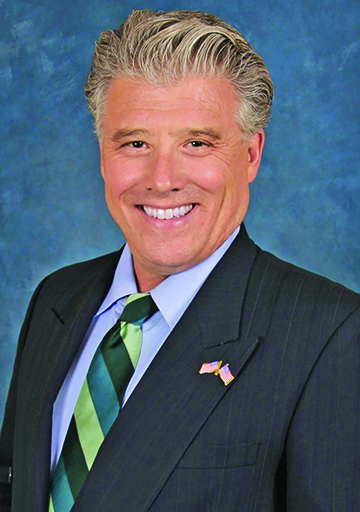
Attorney Randy Corporon, PC represents the seven Denver cops disputing the vaccine mandate.
Attorney Randy Corporon, PC, represents this group of police officers. He moved to block the mandate before District Court Judge Shelley Gilman on Wednesday, September 29. Judge Gilman dismissed the case, however, stating that the court had no authority over the issue because the officers did not exhaust all of their administrative remedies before taking the matter to court. Specifically, this would have been to first petition to the Denver Department of Public Health to overturn the mandate.
Red Tape Blues
In the meantime, Corporon has filed an administrative complaint with the Denver Department of Public Health (DDPH), and he is currently awaiting notice of a hearing being set. “The only thing they told us,” he begins, “is that they will set a hearing and they will let us know 10 days before that hearing.” Corporon feels that DDPH is deliberately hindering the appeal in order to goad the defiant officers into compliance. “The mystery of their process is whether they will expedite this or drag their feet,” Corporon explains. “The thing about these government entities and these big companies is that the longer they drag it out, the more people will just cave and get the shot.” Corporon explains why he took the matter to court before all administrative remedies were exhausted. “We believed that we had legal exceptions based on the exigency and the urgency, [as well as] the futility of going through that petition process first, but the judge disagreed.”
The immediate, blaring, disconcerting issue is the loss of qualified, able-bodied police officers at a time when the circumstances call for all hands on deck. When asked if he thinks the mandate will spur a mass-migration of police officers from the DPD, Corporon explains, “As much as I hate the practical result of it, I hope so. I don’t see any [other] way to stop this incredible, omnipotent, growing government power grab unless people don’t bite the bullet, accept the consequences and move on,” he says. “Some of these police officers are great cops with tons of experience and I’m sure they would be welcomed in other places like Texas or Florida or in cities that don’t try and force an untested treatment into people’s bodies.”
No Pain No Gain

Many contend that the COVID vaccines are experimental drugs which can cause adverse reactions.
Corporon further explains why resistance from the people in the trenches is the best way to counteract government overreach. “The short-term pain will be worth the long-term gain if more and more people stand up,” he says. He then goes on to explain the collective concerns among his colleagues and clientele about the vaccines, “I worry about the long-term effects. If somebody has the vaccine and new strains of the virus come on, is their body going to react improperly? We have heard about risks to reproductive systems, and for people who are giving this to their kids … God almighty,” he attests. “I have cases in my office now where divorced parents and even parents who are still together are fighting legally whether to vaccinate their kids as young as 10 years old.”
Corporon goes on to express his outrage about the wholesale public adoption of these untested treatments. “I am baffled by the media propaganda, the fear and the blind trust in unelected bureaucrats and so-called scientists who change their own positions constantly,” he says “I just had a news crew over here interviewing me about the Eric Coomer defamation case. Of course, they show up masked and they wouldn’t come inside my building because they found out I was unvaccinated. I’m not sick, plus, they have masks on, and we are maintaining a distance of six feet apart. OK — we can stay out here in the rain, it’s fine with me.”
While the charge to overturn the mandate seems daunting, Corporon maintains that a positive outcome for his Denver police officer clients is not out of the realm of possibility. “The best outcome would be an agreement that the orders were issued in error and that they would be rescinded. Of course, you can’t un-vaccinate people but, at the very least, you could restore cops who’ve lost their jobs and you could restore their pay.”
The counterproductivity of the issue is typical of Denver politics where counterintuitive policies and backward thinking are the order of the day. It would seem that in an effort to “protect” citizens from harm by mandating vaccination for police officers, the populace is being left even more exposed to danger by firing the cops who want to be there to serve and protect.
by Mark Smiley | Oct 22, 2021 | Main Articles
by Glen Richardson
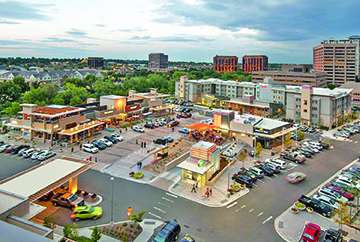
Upstream: Just a half mile up Cherry Creek from Cherry Creek North, in the city of Glendale, there is also a hotel boom occurring, including at CitySet a hotel/dining complex anchored by two hotels (Residence Inn and Hilton Garden Inn) separated by a dining plaza featuring over a half dozen restaurants and eateries.
After Metro Denver suffered the greatest loss in hotel occupancy levels since the Great Depression, there’s been a surprising upsurge in Cherry Creek North and Glendale. Despite the addition of four hotels since 2016 in Cherry Creek North, luxury lodging in the 16-block mixed-use district reports growth in occupancy, length of stay, and types of visitors. Glendale, in turn, expects a return to pre-pandemic occupancy levels as soon as the end of the year.
However, in downtown Denver with more than 50,000 first-class hotel rooms, the loss of convention and meeting business continues to drag down occupancy. Hotels downtown are forecast to average just 48.8% occupancy this year, up from 39.2% in 2020. Average daily room rates are expected to be up just slightly (0.7%). Visitors are looking for more amenities, rather than conference rooms and convention spaces. Cherry Creek’s JW Marriott, for example, is outperforming many downtown hotels.
With the rise in travel, hotels downtown can’t hire back the number of employees needed to meet the demand. Tony Dunn, General Manager of the Sheraton Denver Downtown Hotel, told 9News Denver, “We thought it would be a problem for two-three months and it has become a 12-13-month problem.” Nevertheless, the Mile High City continues to renovate hotels while adding new hotels, including a half-dozen expected to open by year’s end. Another six to eight are expected to be completed by the end of 2022.
Some, however, fear that downtown Denver has become stigmatized as an unsafe area with homelessness, uncleanliness, graffiti, and rising crime rates becoming impossible to ignore.
New Hotel Mecca

Travel Hot Spot: The walkable, tree-lined blocks in Cherry Creek North have helped the district hotel business snap back. The JW Marriott and the district’s newer hotels report growth in occupancy, length of stay, plus new types of visitors.
For more than a decade, the recently remodeled 196 guestroom JW Marriott on Clayton Lane was the only hotel in Cherry Creek North. Then in August of 2016 the Halcyon — a luxury boutique space with 154 rooms-suites opened. Since then, three more hotels opened their doors. They are the 170-room Moxy on Josephine St. in 2017, the 201-room Jacquard on Milwaukee in 2018, plus the Clayton — a Member Club & Hotel — that opened this year. The additions have transformed the district from a place to visit to a place to stay.
Now, within 16 blocks, tourists, travelers, and sightseers can choose from five hotels offering a combined three rooftop pools plus several speakeasy-style bars. Each offers exceptional dining focused on providing unique experiences for their guests.

Hidden Hip Spots: Several Cherry Creek hotels have speakeasy-style bars, including the B&GC, a clandestine drinking spot in the Halcyon revived from ruins of a former post office.
Just a half mile away up Cherry Creek the 0.6 square mile City of Glendale has also been increasing hotel space. In 2012, CitySet, a hotel dining complex at the corner of Colorado Boulevard and Cherry Creek Drive South, was completed with over one-half dozen restaurants and anchored by two hotels — 210 room Hilton Garden Inn and the 125 room Residence Suites Cherry Creek. The small city surrounded by Denver has a total of seven hotels with an aggregate of 1,026 rooms. Glendale Deputy City Manager Chuck Line stated that while revenues from hotels in Glendale were down 53% in August, compared to 2019 by August of this year, it had climbed up to being down only 17% compared to 2019.
Swing In Visitors

RugbyTown: Glendale markets itself as RugbyTown USA and features Infinity Park a stadium that holds international test matches attracting fans and players from across the globe that stay in Glendale’s seven hotels accommodating over a thousand rooms.
Since reopening their doors, the district’s hotels have seen a shift in the type of visitor to Cherry Creek North. For one, hotel leisure travel has increased from 50% to about 75%. They now fill many of the rooms that group and business travel once did.
Moreover, the average length of stay increased from about 1.5 nights to two. In addition, front desks are welcoming many guests who have never before chosen to book a room outside of downtown Denver.
“Adding hotels has been huge for the identity of Cherry Creek North,” says Candace Duran, Sales-Marketing Director at the Halcyon. “It’s so inspiring to be part of the maturation of the district. They make it easier to stay past 5 p.m., which keeps more people in the neighborhood and supporting area businesses.”
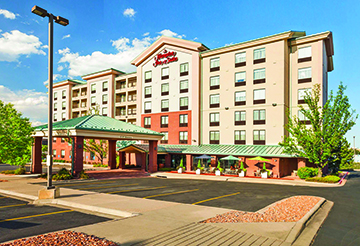
International Destination: Glendale’s Hampton Inn, along with other hotels in the village, are an international destination as rugby players from around the world stay here for international rugby test matches and other rugby tournaments.
Glendale’s hotel occupancy has been greatly enhanced with the addition of the world renown rugby stadium complex named Infinity Park. The governing body of rugby union in the United States, USA Rugby, has moved to Glendale, and national teams from across the world are now playing international test matches in the stadium, along with games featuring Glendale’s own highly acclaimed team with top flight national players known as the American Raptors. The Greater Glendale Chamber of Commerce COO Jeff Allen noted, “As a result of having national rugby championships and international test matches, our hotels are often filled with many international visitors on any given weekend. It has given Glendale a cosmopolitan feel that it certainly never had before.”
Shift From Downtown
“People historically came to Denver for the iconic attractions, shows, and sporting events, but began looking for something new when everything shut down,” explains Sean McNamara, JW Marriott’s Sales-Marketing Director. “Cherry Creek North provided the safety of being outdoors while also being known as a shopping, art, and dining destination.”
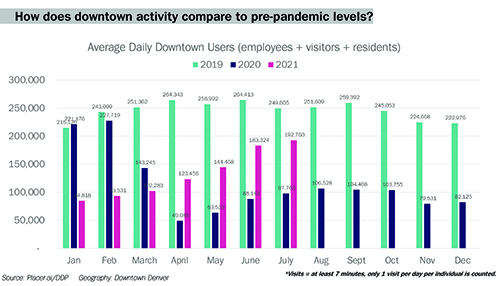
Charting Downtown Decline: Chart by the Downtown Denver Partnership compares downtown activity today compared to pre-pandemic levels.
District hotels also found that offering discount rates and unique package deals throughout the pandemic opened up new possibilities for value-conscious travelers looking to book an exceptional last-minute staycation. Deals included gift cards or complimentary passes to the district’s walkable dining, spa, fitness, and shopping options.
“We saw so many guests who had never stayed in Cherry Creek North before,” says the Jacquard’s Melissa Bush, Sales-Marketing Director. “People could suddenly get a luxury hotel experience at a price point that worked for them.”
Quick Recovery

Splish, Splash: Three Cherry Creek hotels feature rooftop pools to attract guests including this one at the Halcyon. Visitors are looking for more amenities, rather than conference rooms and convention spaces.
Now, rooms and occupancy rates in Cherry Creek North are nearing pre-pandemic levels, which is especially encouraging compared to hotel recovery nationally. A recent PricewaterhouseCoopers (PwC) report projects U.S. hotel occupancy this year to increase to 57.1%, with average daily room rates gaining 8%.
In Cherry Creek North, Duran reported that the Halcyon has exceeded financial goals for several months in a row, while JW Marriott’s McNamara saw steady and continued increases in both occupancy and average daily rate from June to November of 2020, with growth continuing this year.
Nick LeMasters, CEO of the Cherry Creek North Business Improvement District, believes the neighborhood “has emerged as a premier travel destination for people from near and far.” He adds that with five hotels, a high concentration and variety of restaurants and boutiques, and walkability of the area, “ It makes sense that people come to visit and end up staying.”
Glendale’s Allen emphasizes that, “The corridor along Cherry Creek streams from Glendale through Cherry Creek North, and now has enough hotel venues and dinner, sporting, and entertainment outlets to favorably compete with anybody in Colorado. These are very exciting times for this area.”


















